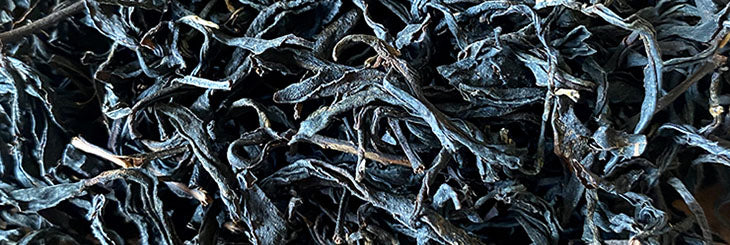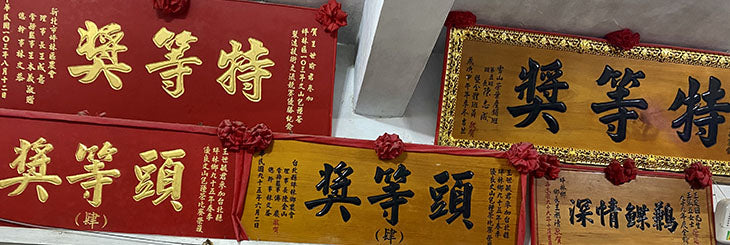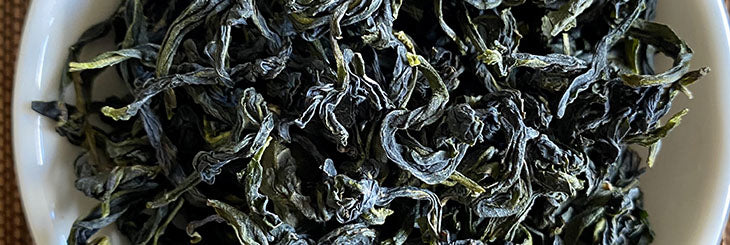Eco-Cha Tea Club

Competition Grade Tie Guan Yin Oolong| Eco-Cha Tea Club
Batch 68 of the Eco-Cha Tea Club is a Competition Grade Tie Guan Yin Oolong Tea that ended up being awarded Third Place Category Prize (top 18%) iby the Muzha Farmers' Association. The above photo symbolizes the distinctive quality of this tea type. Following the initial processing on the day of harvest, where the leaves undergo extensive withering, oxidation, and tumble heating, they are then tightly rolled and dried. During this rolling and drying process, when the leaves are wrapped in cloth into a ball shape, they are gently heated. This, in effect, steams the leaves in their own juices. And this is where Tie Guan Yin derives its distinctly tangy character.

Light Roast High Mountain Oolong Tea | Eco-Cha Tea Club
Batch 65 of the Eco-Cha Tea Club was procured by them with the intention of roasting it to the standard of the Lugu Farmers' Association Dong Ding Oolong Tea Competition. It won Second Place Category Award (top 8%) of over 6000 entries. Our batch has only been very delicately roasted — preserving its original fresh character, while balancing out the flavor profile and stabilizing its composition.

Dong Pian Oolong Tea | Eco-Cha Tea Club
Batch 64 of the Eco-Cha Tea Club comes from this family farm/home factory in Phoenix Village, Lugu Township, Taiwan. It's a late winter harvest of their plot of Ying Xiang #20 that was processed in the local fashion. Ying Xiang is a hybrid cultivar developed by Taiwan's Tea Research and Extension Station (TRES) that was made public less than 10 years ago.

Competition Grade Wenshan Baozhong Tea Tasting Notes | Eco-Cha Tea Club
Batch 63 of the Eco-Cha Tea Club was harvested in November 2020, processed, and then sorted to remove stem material and any discolored leaves in preparation for the winter 2020 competition and the New Taipei City Farmers's Association.
The distinctive quality of Baozhong Tea is that the leaves are shuffled well to induce uniform oxidation, but they are only minimally rolled. This keeps their physical composition in tact. The leaves are not damaged by pressure rolling. This locks in a fresh, green quality that put Baozhong Tea in a category of its own.

Competition Grade Wuyi Oolong | Eco-Cha Tea Club
Batch 62 of the Eco-Cha Tea Club comes from the same plot of tea as last month's batch. When we tasted this month's batch of unroasted Wuyi Oolong, following the heavily roasted batch that we shared last month, we were inspired to offer these two very different tasting teas back-to-back. Tasting these two batches of tea that were made from basically the same raw produce (different seasonal harvests), but processed differently, provides an educational experience on how significant processing methods are in determining the final product.

Heavy Roast Wuyi Oolong Tea Tasting Notes | Eco-Cha Tea Club
We are kicking off our sixth year of the Eco-Cha Tea Club this month, with batch 61! And this month's batch of Heavy Roast Wuyi Oolong is a record breaker in that it is definitely the most thoroughly roasted batch of tea that we have shared to date. We think this tea will be appealing at this time of year — especially for our members who live in colder climates. This is a very hearty, rich, and warming brew. So we like to think it will make the holiday season even cozier!

Eco-Farmed Specialty Roast Oolong Tea | Eco-Cha Tea Club
This batch of tea was harvested last spring, and processed as a medium oxidized Oolong. The stems were then removed in preparation for extensive roasting. Mr. Xie proceeded to roast these leaves four times in total. The first roasting was done in the standard convection type oven to remove all remaining moisture from the leaves. The following 3 roastings were done in an oven designed for roasting coffee beans!

Eco-Farmed High Mountain Oolong Tea | Eco-Cha Tea Club Tasting Notes
This crop of tea is the most recent growth picked from new branches on the trees that were allowed to grow for four months or so, similar to our recent batch of Traditional Hong Shui Oolong that we offered last month. As with last month's batch, this tea was also affected by the Green Leafhopper, and other pests. This is inevitable, given that this is an organic farm and the summer months are most susceptible to bugs!

Traditional Hong Shui Oolong Tea | Eco-Cha Tea Club
Batch 58 of the Eco-Cha Tea Club is a Hong Shui Oolong made in the traditional fashion by our friend in his home factory in Phoenix Village, Taiwan. He let his family plot of tea behind their traditional 3-sided farmhouse continue to grow after spring harvest in April until the last few days in July. This allows the tea trees to rejuvenate by growing naturally during the most vegetative phase of their annual cycle. He then harvested just the tops of the new growth before pruning his trees for fall harvest.

Pinglin Qin Xin Black Tea Tasting Notes | Eco-Cha Tea Club
Batch #56 of the Eco-Cha Tea Club is a Pinglin Qing Xin Black Tea — summer 2019 harvest, from the same source as last month's edition of award winning Wenshan Baozhong Tea. This is the first batch of Black Tea we have sourced from the Pinglin region in northern Taiwan, and it is further supporting evidence of the fact that high quality tea can be made from low to mid-elevation farms. We were lucky to have sourced the remainder of two consecutive days of last summer's harvest that were combined to provide just enough to be shared with the Eco-Cha Tea Club! Black Tea reaches it peak of quality after at least one year of aging.

Pinglin Qin Xin Black Tea | Eco-Cha Tea Club
Batch #56 of the Eco-Cha Tea Club is a Black Tea made from the Qing Xin cultivar, grown in the Pinglin tea growing region in northern Taiwan. This Black Tea is made by the same artisan tea maker who made the top 5% award-winning Baozhong Tea we offered as Batch #55 of the Eco-Cha Tea Club. His spring and winter crops are made into Wenshan Baozhong tea, for which his family has a legacy, and his summer crops are made into high-grade Black Tea.

Competition Grade Wenshan Baozhong Tea Tasting Notes| Eco-Cha Tea Club
This is what an award winning Wenshan Baozhong Tea looks like, in its dry leaf state, of course. Notice the uniformity in the size and coloration of the leaves. The yellow hues are only in the spine of the leaves, which would naturally protrude into a stem, but the stems have been removed, along with the larger, lighter colored, over-matured leaf stock. This uniformity of leaf material offers a pure flavor profile. It allows for a complexity of aromatic and flavor notes, but it comes from a uniform stock which is essential in producing a purity of character. This is a fundamental aspect of competition grade tea. It's not muddled. It's refined.

